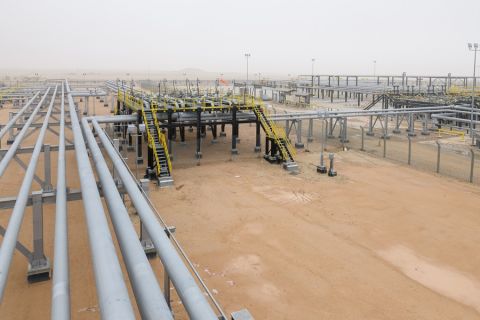Across the board, major oil companies and integrated independents boosted their third-quarter earnings and revenues above year-ago levels. The Petroleum Finance Week newsletter's third-quarter earnings scoreboard shows a 46.2% year-over year increase in earnings and 20.2% more revenues. U.S.-based integrated independents had an especially strong showing, followed by the majors and the Canadian integrateds. But many of the companies reported production declines, especially gas. ExxonMobil reported 10.3% less gas production in the quarter, compared with third-quarter 2002; Royal Dutch/Shell, 12.4% less; and BP, 1% less. ExxonMobil and BP reported 1.3% and 3.6% more oil production, respectively; Royal Dutch/Shell, 3% less. Paul Cheng, an analyst with Lehman Brothers, calls ExxonMobil's reduced U.S. gas production "frightening." He believes the company may begin to show production growth globally next year, mainly due to several project ramp-ups in West Africa and Norway. As for the U.S., Jacques Rousseau, an analyst with Friedman Billings Ramsey, has doubts as to whether ExxonMobil's oil and gas production will be turned around. "...Given the decline in the U.S. E&P segment capital budget, from an annual average of $2.4 billion in the 2001-02 time period to a run rate of $2 billion in 2003, one could argue that fewer resources are being used to mitigate the current decline rates...and in fact these decline rates may accelerate." Royal Dutch/Shell's lower gas production was primarily due to lower demand in Europe and New Zealand and field declines in the U.S. and the U.K., says Prudential analyst Michael Mayer. Rousseau says that the company expects minimal, if any, production-volume growth through 2005. BP's third-quarter oil production results were improved by a one-month contribution from the new TNK-BP Russian venture, which produced 208 million barrels of oil equivalent a day for BP, Rousseau says. -Jodi Wetuski
Recommended Reading
Shipping Industry Urges UN to Protect Vessels After Iran Seizure
2024-04-19 - Merchant ships and seafarers are increasingly in peril at sea as attacks escalate in the Middle East.
Paisie: Crude Prices Rising Faster Than Expected
2024-04-19 - Supply cuts by OPEC+, tensions in Ukraine and Gaza drive the increases.
Report: Freeport LNG Hits Sixth Day of Dwindling Gas Consumption
2024-04-17 - With Freeport LNG operating at a fraction of its full capacity, natural gas futures have fallen following a short rally the week before.
Permian NatGas Hits 15-month Low as Negative Prices Linger
2024-04-16 - Prices at the Waha Hub in West Texas closed at negative $2.99/MMBtu on April 15, its lowest since December 2022.
BP Starts Oil Production at New Offshore Platform in Azerbaijan
2024-04-16 - Azeri Central East offshore platform is the seventh oil platform installed in the Azeri-Chirag-Gunashli field in the Caspian Sea.


